★★
“Fires mostly blanks.”
 Buffalo police officer Megan (Sadeghian) is a highly-skilled cop, but has a crisis of confidence after being involved in the accidental shooting of a colleague. To help get her out of that mindset, partner Jeremy (Johnson) invites Megan on a weekend camping getaway in upstate New York, along with another couple. This goes horribly wrong, after they stumble across the summary execution of a drug-dealer by the local sheriff, Preacher (Kennedy) and his death squad. The four campers are now a problem for Preacher, so he seals off the area, and unleashes a slew of hunters, putting a ten thousand dollar bounty on the head of each target. Of course, you don’t have to be psychic to see it won’t be easy, courtesy of Megan.
Buffalo police officer Megan (Sadeghian) is a highly-skilled cop, but has a crisis of confidence after being involved in the accidental shooting of a colleague. To help get her out of that mindset, partner Jeremy (Johnson) invites Megan on a weekend camping getaway in upstate New York, along with another couple. This goes horribly wrong, after they stumble across the summary execution of a drug-dealer by the local sheriff, Preacher (Kennedy) and his death squad. The four campers are now a problem for Preacher, so he seals off the area, and unleashes a slew of hunters, putting a ten thousand dollar bounty on the head of each target. Of course, you don’t have to be psychic to see it won’t be easy, courtesy of Megan.
When your story is one with which every viewer will be familiar, like this, it increases the need to nail the execution. Here, the results are a bit of a mixed bag, and I’m being extremely kind with that description. The best thing the movie had going for it, is Sadeghian in the lead. As the poster indicates, it looks like she could have been a better Lara Croft than Alicia Vikander (y’know, back when Lara still used guns…). She does a good job of commanding the viewer’s attention when she’s on screen. Unfortunately, the villains are feeble in comparison: often they’re the biggest danger to themselves, either deliberately or, in one especially eyeroll-worthy scene, accidentally. There’s a political subtext here too, which seems all the more dubious, given the film’s topic.
The biggest issue, though, are the frequent ways in which its flaws are obvious. A convenience store shoot-out, in which not even a packet of chips is displaced. A villain who gets “knocked out”, by a stone, marginally above pebble sized, lobbed gently toward them. The heroine supposedly being chased by a random hovering helicopter, while the vegetation nearby barely moves. Bad guys (and girls) whose incompetence is only exceeded by their inaccuracy. Thoroughly unconvincing bullet-holes. The list of problems here is just too long to ignore. On the other hand, I very much appreciated the presence of veteran actress Lynn Lowry, as a local who is less than enamoured by Sheriff Preacher. In a movie often teetering on the edge of self-parody, she has a calming influence, that helps keep proceedings grounded.
Lamberson also makes decent use of the wilderness locations. In particular, a series of narrow canyons, that provide a mazelike setting through which the hunters and hunted must proceed. But the good elements – the final knife fight between Megan and Preacher is also energetic – never last long, before something shows up to take you out of the viewing experience. I’d been waiting for this to show up on a streaming service for a while. Suffice it to say, it fell some way short of my expectations, and I probably shouldn’t have bothered getting my hopes up.
Dir: Gregory Lamberson
Star: Alexandra Faye Sadeghian, Bill Kennedy, Peter Johnson, Nicole Colon





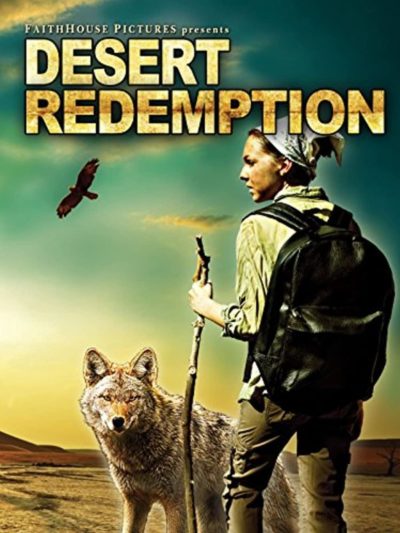 I’ve no problem per se with faith-based cinema. My main issue is that they tend to be, literally, preaching to the converted, and if you’re not already on board, they tend not to work, purely from a cinematic perspective. There are exceptions:
I’ve no problem per se with faith-based cinema. My main issue is that they tend to be, literally, preaching to the converted, and if you’re not already on board, they tend not to work, purely from a cinematic perspective. There are exceptions: 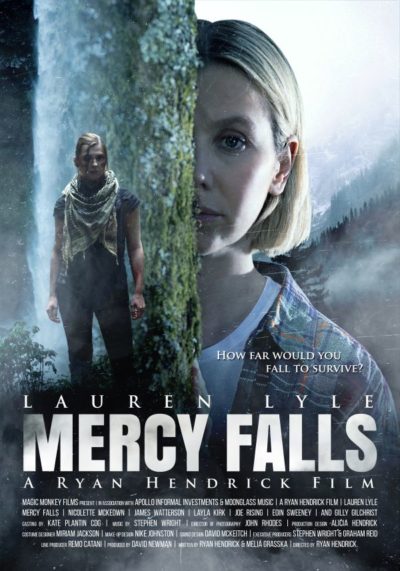 Even though I haven’t lived there since the eighties, I remain a sucker for a Scottish film. This delivers, with no shortage of rugged mountain landscapes, beautiful lochs, a ceilidh band and trees. So. Many. Trees. The foliage is understandable, because most of it takes places in the woods, where Rhona (Lyle) and her friends are looking for a cabin, deep in the wilds, which belonged to her late father. To help find it, they enlist the help of local Carla (McKeown), whom they meet down the pub when they have a pre-trip planning get-together. She initially seems fun to be with. But once they’re away from civilization, a shocking incident proves she… has issues, shall we say. And might not be the only one in the party.
Even though I haven’t lived there since the eighties, I remain a sucker for a Scottish film. This delivers, with no shortage of rugged mountain landscapes, beautiful lochs, a ceilidh band and trees. So. Many. Trees. The foliage is understandable, because most of it takes places in the woods, where Rhona (Lyle) and her friends are looking for a cabin, deep in the wilds, which belonged to her late father. To help find it, they enlist the help of local Carla (McKeown), whom they meet down the pub when they have a pre-trip planning get-together. She initially seems fun to be with. But once they’re away from civilization, a shocking incident proves she… has issues, shall we say. And might not be the only one in the party.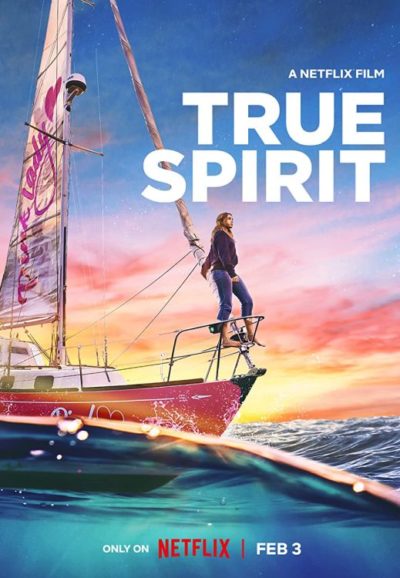 This blandly inspirational tale from Australia is based on real events. In 2009, sixteen-year-old Jessica Watson (Croft) set sail out of Sydney Harbour, intending to become the youngest person ever to sail around the world solo and unassisted. 210 days later, she returned to Sydney safely. There: I’ve spoiled it for you. Oh, alright: in between departure and arrival, stuff happens. There is also some stuff which happens before she leaves, with certain parties questioning whether she is fit to carry out such a dangerous voyage, citing her lack of age and ocean-going experience. A close encounter between Jessica’s boat the Pink Lady and a freighter, while on a test sailing trip, only seemed to confirm there was good reason for concern.
This blandly inspirational tale from Australia is based on real events. In 2009, sixteen-year-old Jessica Watson (Croft) set sail out of Sydney Harbour, intending to become the youngest person ever to sail around the world solo and unassisted. 210 days later, she returned to Sydney safely. There: I’ve spoiled it for you. Oh, alright: in between departure and arrival, stuff happens. There is also some stuff which happens before she leaves, with certain parties questioning whether she is fit to carry out such a dangerous voyage, citing her lack of age and ocean-going experience. A close encounter between Jessica’s boat the Pink Lady and a freighter, while on a test sailing trip, only seemed to confirm there was good reason for concern. Despite a striking poster (well played, PR team), for the first hour, you’ll probably be wondering why this is included here. Corporate lawyer Ray Harper (Tucci) is on the road, trying to convince reluctant local farmers to sell their land for development. He’s also taking advantage of the away time to hook up with his bit on the side, Brooke Hamilton (Malcolm). Both these enterprises are rudely interrupted when the couple are pulled over by corrupt cop, Williams (Johnston), and abducted at gunpoint. They are the next “guests” on an island run by TJ (McDonald), where he and his pals can get together to hunt… The Most Dangerous Game. Except, they can’t find any of that, so have to make do with a middle-aged executive and his other woman.
Despite a striking poster (well played, PR team), for the first hour, you’ll probably be wondering why this is included here. Corporate lawyer Ray Harper (Tucci) is on the road, trying to convince reluctant local farmers to sell their land for development. He’s also taking advantage of the away time to hook up with his bit on the side, Brooke Hamilton (Malcolm). Both these enterprises are rudely interrupted when the couple are pulled over by corrupt cop, Williams (Johnston), and abducted at gunpoint. They are the next “guests” on an island run by TJ (McDonald), where he and his pals can get together to hunt… The Most Dangerous Game. Except, they can’t find any of that, so have to make do with a middle-aged executive and his other woman. Paramedic Melina (Sila) regains consciousness to find herself in the back of her ambulance, along with her patient, Franson (Loranger), and the rest of the crew in various states of health. The vehicle had gone off the road and fallen into a ravine, along with the accompanying police car. It turns out they were transporting Franson and another prisoner to hospital when the crash took place – and it quickly becomes apparent that what happened was far from an accident. A posse of camo-clad hunters close in on them, led by Caine (Gray). Their mission to make all the vehicle’s occupants, both criminal and otherwise, pay for the sins of their pasts. They’ve brought with them the wronged parties in question, to exact bloody revenge.
Paramedic Melina (Sila) regains consciousness to find herself in the back of her ambulance, along with her patient, Franson (Loranger), and the rest of the crew in various states of health. The vehicle had gone off the road and fallen into a ravine, along with the accompanying police car. It turns out they were transporting Franson and another prisoner to hospital when the crash took place – and it quickly becomes apparent that what happened was far from an accident. A posse of camo-clad hunters close in on them, led by Caine (Gray). Their mission to make all the vehicle’s occupants, both criminal and otherwise, pay for the sins of their pasts. They’ve brought with them the wronged parties in question, to exact bloody revenge.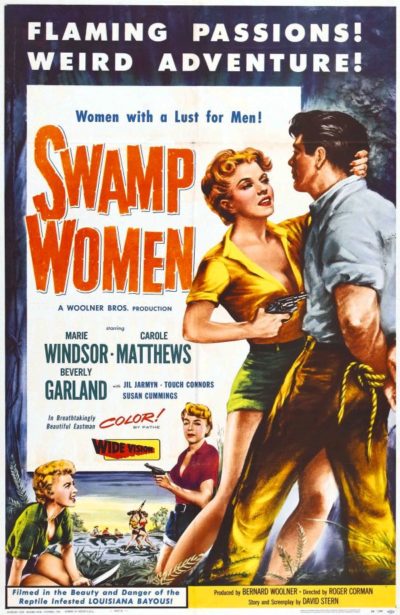 One of the earliest films directed by Roger Corman, it’d be a major stretch to call this a good film, yet I can’t deny I found it entertaining. It definitely has better female characters than most movies of the mid-fifties. Four women break out of jail and head into the swamps, in search of stolen diamonds which were previously hidden in the Louisiana swamps. Except, one of them is an undercover police officer, Lee Hampton (Mathews), who had been inserted into prison to join the gang and lead the escape, in the hope of recovering the loot. After the car breaks down, they hijack a boat owned by an oil prospector, Bob, and his girlfriend, taking them hostage as they head deeper into the bayou.
One of the earliest films directed by Roger Corman, it’d be a major stretch to call this a good film, yet I can’t deny I found it entertaining. It definitely has better female characters than most movies of the mid-fifties. Four women break out of jail and head into the swamps, in search of stolen diamonds which were previously hidden in the Louisiana swamps. Except, one of them is an undercover police officer, Lee Hampton (Mathews), who had been inserted into prison to join the gang and lead the escape, in the hope of recovering the loot. After the car breaks down, they hijack a boat owned by an oil prospector, Bob, and his girlfriend, taking them hostage as they head deeper into the bayou.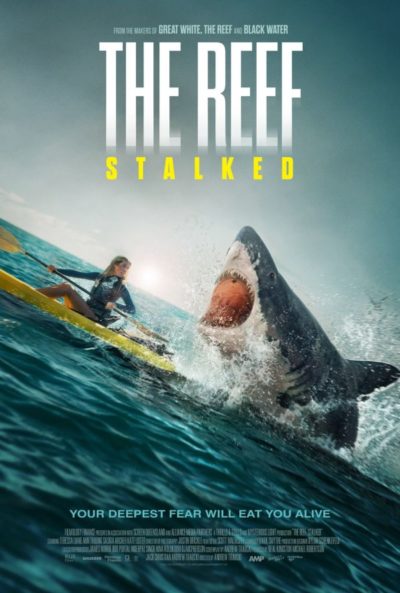 This is a sequel to Traucki’s 2010 film, The Reef, whose synopsis reads: “A sailing trip becomes a disaster for a group of friends when the boat sinks and a white shark hunts the helpless passengers.” I haven’t seen it, yet based on that, I’m not sure I need to. Replace “sailing” with “kayaking”, and you’re more or less here. Perhaps lob in a bit borrowed from
This is a sequel to Traucki’s 2010 film, The Reef, whose synopsis reads: “A sailing trip becomes a disaster for a group of friends when the boat sinks and a white shark hunts the helpless passengers.” I haven’t seen it, yet based on that, I’m not sure I need to. Replace “sailing” with “kayaking”, and you’re more or less here. Perhaps lob in a bit borrowed from 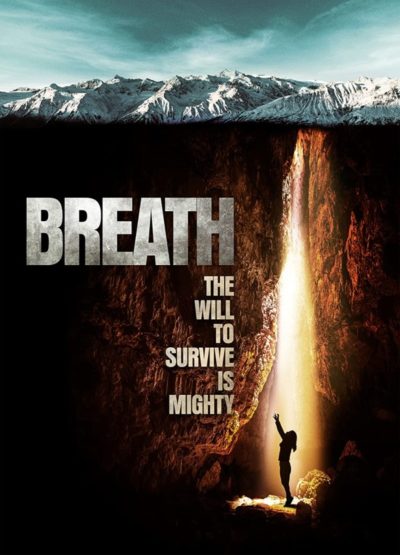 Lara Winslet (Daigh) is a vulcanologist, who is on the side of a mountain in Italy, taking samples, when the ground gives way beneath her, and she falls into an underground pit, damaging her leg in the process. Help isn’t going to come, so with limited resources (not to mention a count of functioning limbs that stops at three), she is going to need to cope with the situation on its own, and figure a way out of what could easily become a fatal scenario. Meanwhile, on the outside, her father (Cosmo) is becoming increasingly frantic. This is erhaps because if Lara doesn’t come back, he’s going to be stuck permanently with her kid (Di Mauro). That would be my reaction, anyway…
Lara Winslet (Daigh) is a vulcanologist, who is on the side of a mountain in Italy, taking samples, when the ground gives way beneath her, and she falls into an underground pit, damaging her leg in the process. Help isn’t going to come, so with limited resources (not to mention a count of functioning limbs that stops at three), she is going to need to cope with the situation on its own, and figure a way out of what could easily become a fatal scenario. Meanwhile, on the outside, her father (Cosmo) is becoming increasingly frantic. This is erhaps because if Lara doesn’t come back, he’s going to be stuck permanently with her kid (Di Mauro). That would be my reaction, anyway…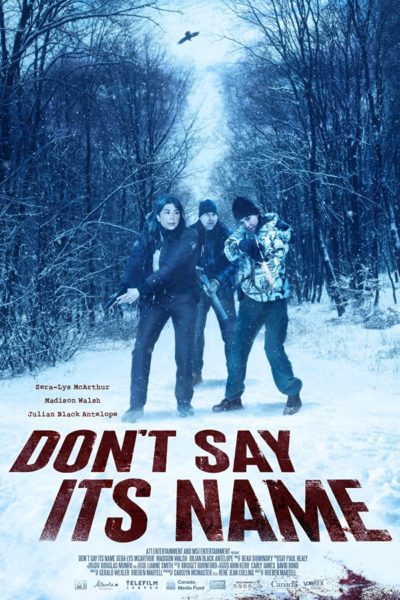 I was going to start this with a warning to try and avoid reading other reviews of this before watching it, because it felt as if, without exception, they all included spoilers for a significant plot-point, that wasn’t actually revealed until deep into the movie. Heck, the IMDb synopsis does it too. However, having sat through the entirety of this bland piece of indigenous folk pseudo-horror, all I can say is “Meh.” You do you: it’s probably not as if it’s going to have much impact, because it’s hard to spoil something which already smells past its best before date.
I was going to start this with a warning to try and avoid reading other reviews of this before watching it, because it felt as if, without exception, they all included spoilers for a significant plot-point, that wasn’t actually revealed until deep into the movie. Heck, the IMDb synopsis does it too. However, having sat through the entirety of this bland piece of indigenous folk pseudo-horror, all I can say is “Meh.” You do you: it’s probably not as if it’s going to have much impact, because it’s hard to spoil something which already smells past its best before date.